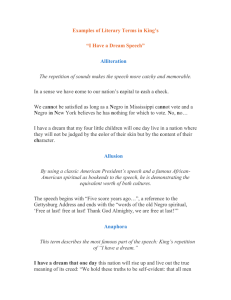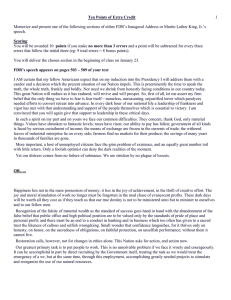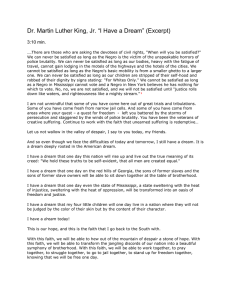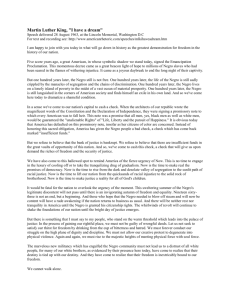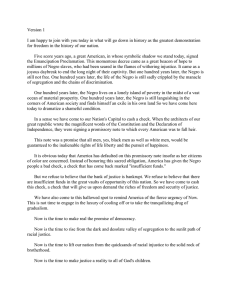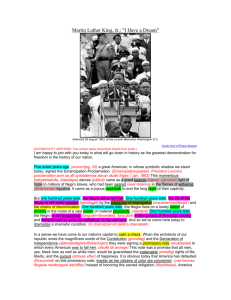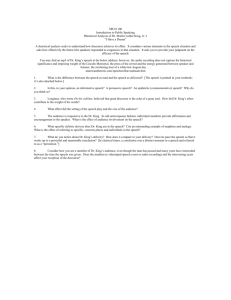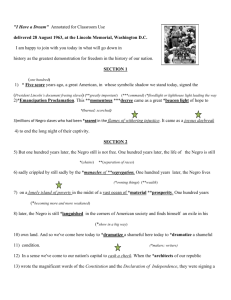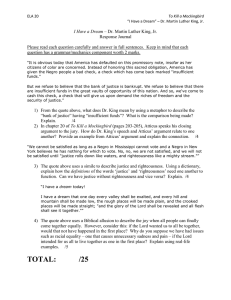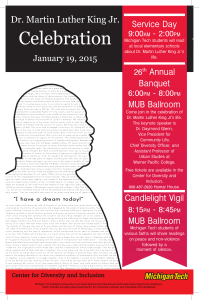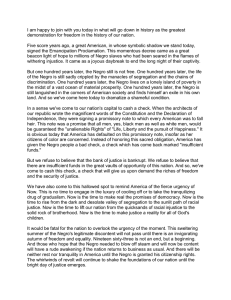Rhetorical Devices in MLK's 'I Have a Dream' Speech
advertisement
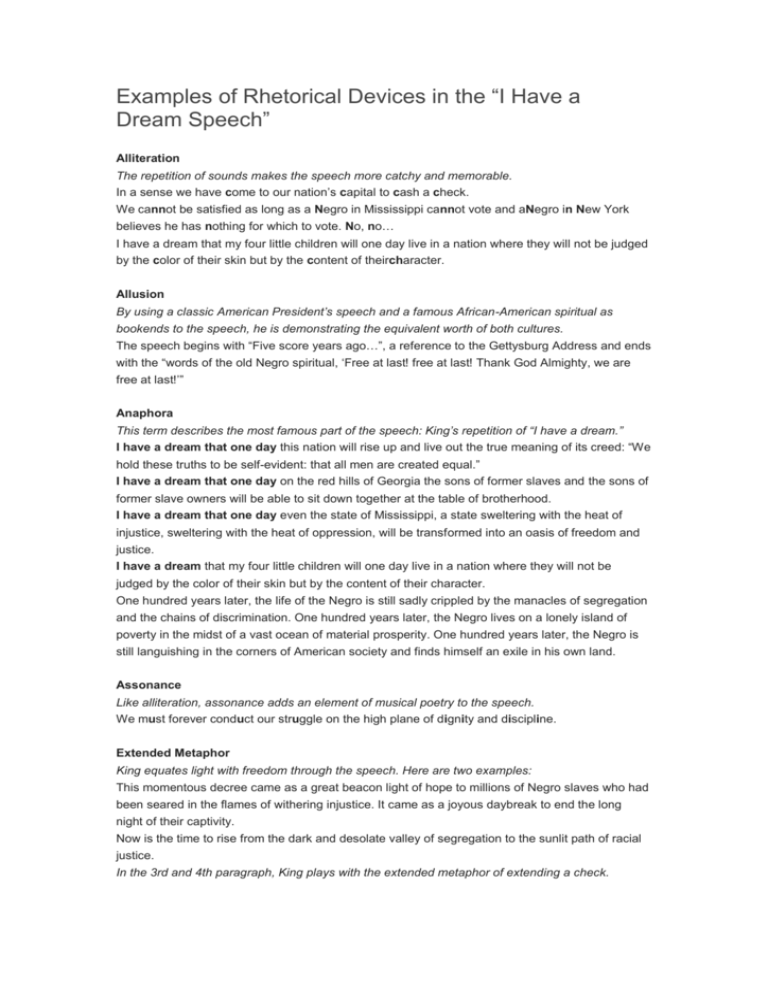
Examples of Rhetorical Devices in the “I Have a Dream Speech” Alliteration The repetition of sounds makes the speech more catchy and memorable. In a sense we have come to our nation’s capital to cash a check. We cannot be satisfied as long as a Negro in Mississippi cannot vote and aNegro in New York believes he has nothing for which to vote. No, no… I have a dream that my four little children will one day live in a nation where they will not be judged by the color of their skin but by the content of theircharacter. Allusion By using a classic American President’s speech and a famous African-American spiritual as bookends to the speech, he is demonstrating the equivalent worth of both cultures. The speech begins with “Five score years ago…”, a reference to the Gettysburg Address and ends with the “words of the old Negro spiritual, ‘Free at last! free at last! Thank God Almighty, we are free at last!’” Anaphora This term describes the most famous part of the speech: King’s repetition of “I have a dream.” I have a dream that one day this nation will rise up and live out the true meaning of its creed: “We hold these truths to be self-evident: that all men are created equal.” I have a dream that one day on the red hills of Georgia the sons of former slaves and the sons of former slave owners will be able to sit down together at the table of brotherhood. I have a dream that one day even the state of Mississippi, a state sweltering with the heat of injustice, sweltering with the heat of oppression, will be transformed into an oasis of freedom and justice. I have a dream that my four little children will one day live in a nation where they will not be judged by the color of their skin but by the content of their character. One hundred years later, the life of the Negro is still sadly crippled by the manacles of segregation and the chains of discrimination. One hundred years later, the Negro lives on a lonely island of poverty in the midst of a vast ocean of material prosperity. One hundred years later, the Negro is still languishing in the corners of American society and finds himself an exile in his own land. Assonance Like alliteration, assonance adds an element of musical poetry to the speech. We must forever conduct our struggle on the high plane of dignity and discipline. Extended Metaphor King equates light with freedom through the speech. Here are two examples: This momentous decree came as a great beacon light of hope to millions of Negro slaves who had been seared in the flames of withering injustice. It came as a joyous daybreak to end the long night of their captivity. Now is the time to rise from the dark and desolate valley of segregation to the sunlit path of racial justice. In the 3rd and 4th paragraph, King plays with the extended metaphor of extending a check. In a sense we have come to our nation’s capital to cash a check… (This check metaphor continues) A musical metaphor: With this faith we will be able to transform the jangling discords of our nation into a beautiful symphony of brotherhood. There are many more metaphor examples. Could you find them all? Metonymy These places are not chosen at random. They represent locations that were filled with racism at the time. For instance, the KKK had just resurged in Stone Mountain. But not only that; let freedom ring from Stone Mountain of Georgia! Let freedom ring from Lookout Mountain of Tennessee! Let freedom ring from every hill and molehill of Mississippi. Hyperbole We could call this example hyperbole, because King is using lots of “alls” and “every”s. But this hyperbole belies a seriousness; he believes that true justice will only come when every person believes in freedom for all. And when this happens, when we allow freedom to ring, when we let it ring from every village and every hamlet, from every state and every city, we will be able to speed up that day when all of God’s children, black men and white men, Jews and Gentiles, Protestants and Catholics, will be able to join hands and sing. Parallelism If you ever want to jazz up a crowd, use some parallelism in your sentences. It will make people ready to fight…peacefully, of course. It also makes the lines memorable, and perhaps represents the equality of the people fighting together. Go back to Mississippi, go back to Alabama, go back to South Carolina, go back to Georgia, go back to Louisiana, go back to the slums and ghettos of our northern cities, knowing that somehow this situation can and will be changed. With this faith we will be able to work together, to pray together, to struggle together, to go to jail together, to stand up for freedom together, knowing that we will be free one day. Personification King is casting American society as a person who has done African-Americans wrong. He believes that people who are fighting for civil rights aren’t fighting a person, but rather a system. It is obvious today that America has defaulted on this promissory note insofar as her citizens of color are concerned. Instead of honoring this sacred obligation, America has given the Negro people a bad check, a check which has come back marked “insufficient funds.” Simile This simile demonstrates the power of justice and righteousness, as well as the belief that equality is a natural thing. It’s also one of the most famous lines of the speech. No, no, we are not satisfied, and we will not be satisfied until justice rolls down like waters and righteousness like a mighty stream. Synecdoche By representing people as bodies or flesh, King is reminding his audience of that the problems they’re currently facing are related to their skin color. We can never be satisfied, as long as our bodies, heavy with the fatigue of travel, cannot gain lodging in the motels of the highways and the hotels of the cities. I have a dream that one day every valley shall be exalted, every hill and mountain shall be made low, the rough places will be made plain, and the crooked places will be made straight, and the glory of the Lord shall be revealed, and all flesh shall see it together. Could you find other literary terms in the speech? Note them below.
